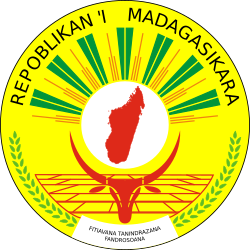| |||||||||||||||||||||||||||||||
All 107 seats in the National Assembly 54 seats needed for a majority | |||||||||||||||||||||||||||||||
|---|---|---|---|---|---|---|---|---|---|---|---|---|---|---|---|---|---|---|---|---|---|---|---|---|---|---|---|---|---|---|---|
| |||||||||||||||||||||||||||||||
 |
|---|
Parliamentary elections were held in Madagascar on 8 August 1965. [1] The result was a victory for the Social Democratic Party, which won 104 of the 107 seats (reduced from 127) in the National Assembly. [2]


